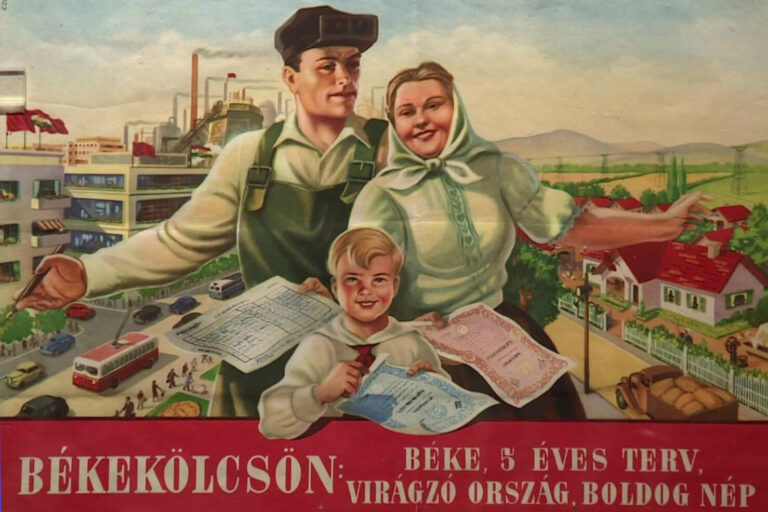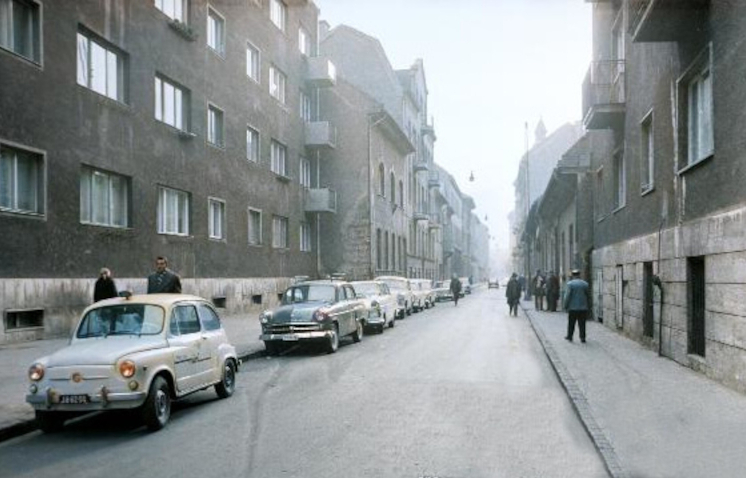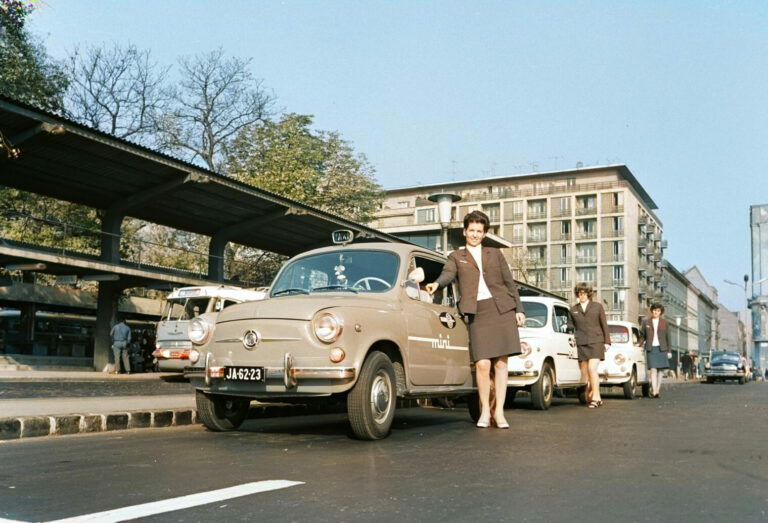1972 - Like animals.
The following article was published in December 1972 in the current issue of the magazine "VOLÁN". It is not about cars; it is also only tangentially about buses and trains, since the subject of the report is the passenger who uses the service.
The original title of the article is "Drunk passengers" and it is about commuters from Sabo, who, after two or three weeks on Fridays and Saturdays, set off on their five to six hour journey home on the infamous "Black Train" with their wages in their pockets. The author of this article has signed his article with the signature "-ér-".
Shocking images and shocking lines from fifty years ago:
Drunk passengers
(Volán magazine, December 1972)
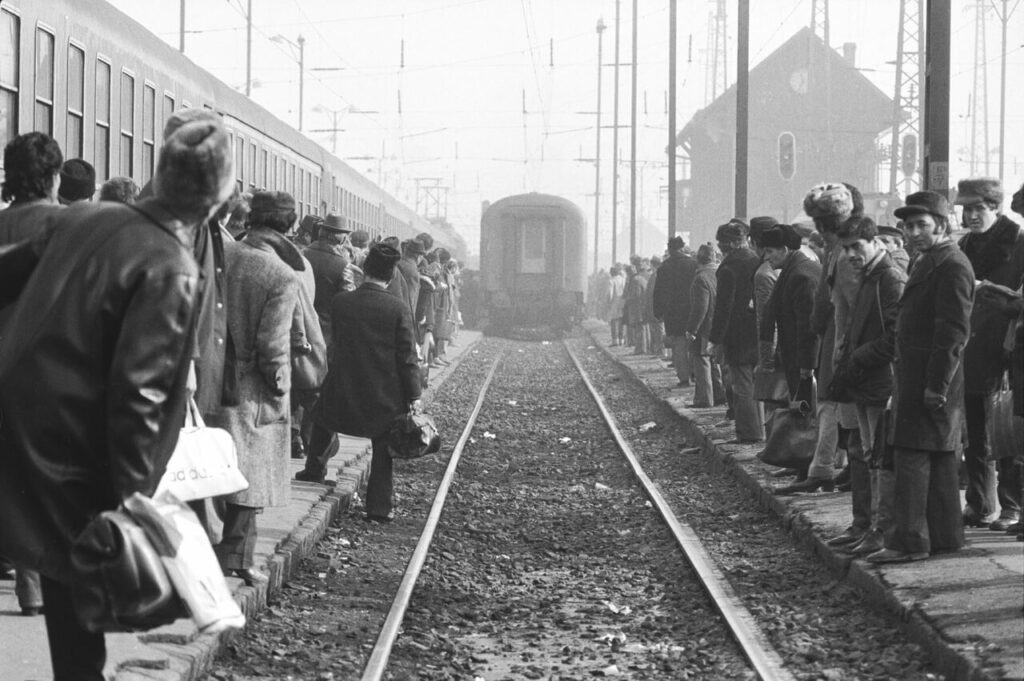
Péter Korniss - Waiting to be pushed, 1981
Thirty-five thousand people will set off from Sunday evening to Monday morning from Szabolcs to travel by bus and then by train to their distant workplaces. After a week or two, they will return home on Friday and Saturday: on the weekend after payday, they will take trains to Szabolcs and change buses.
By the time they get home - at Budapest railway stations, on trains, at bus transfers, in and around rural stations - the occasion is drinking them in.
Fifteen of them: county and municipal leaders, and Volán workers.
In Nyíregyháza, Imre Szilágyi, member of the executive committee of the county council, head of the county directorate of the Statistical Office, also representing commuters in his constituency; Mihály Tomasovszki, acting head of the labour department of the county council, who is officially dealing with the problem of commuting.
In Dombrád, a commuter village of the Kisvárda district, József Nagy, secretary of the village party committee ; László Nagy, council president; Lukács Halmosi
Chief of the MÁV station and party secretary of the basic organisation.
In Hodász, where the commuters of Kántorjánosi, which is part of the common council, are also represented: council secretary Dániel Angyal; Lajos llyés, chairman of the local council; Ferenc Garami, primary school director, who senses the problems of the commuters' schoolchildren; Bertalan Lakatos, chairman of the ÁFÉSZ (also the local hospitality industry supervisor); Lajos Kun, former council chairman.
In Mátészalka, the employees of the management of Volán 5, who are at work, while
their nerves and sometimes their skin: bus drivers György Murnyák and Béla Mike, bus guides Mária Kővári, Antal Juhari and András Litauszki.
Horror stories
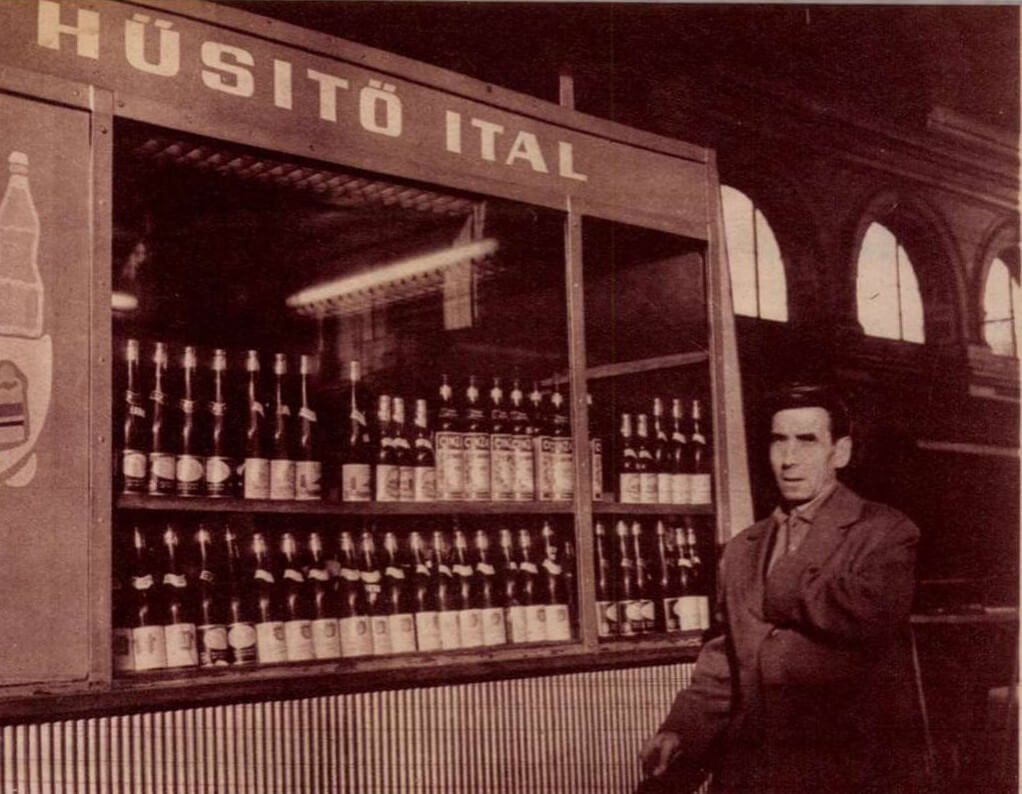
Cooling drink - on the Passenger Transport Company's premises; but underneath it they sell spirits
HODÁSZ
FERENC GARAMI Primary School Director:
- We went on a trip to Lake Balaton. We boarded the plane with the children and wanted to go into the reserved cabin, but our seats were already taken by others. I went in to ask to be given the cabin, and then I saw that two people were there, frozen with blood. They had drunkenly stabbed each other. This was the children's first experience of the trip to Lake Balaton...
LAJOS KUN, former President of the Council of Hodas:
- The rush is life-threatening when drunk people rush off the train and into the bus. This is how Mrs József Farkas, a resident of Kántorjános and mother of 6 children, was trampled under the wheels at the bus station in Hodász in May 1971. She died.

Passenger services are in progress.
DOMBRADE
HALMOSI LUKÁCS Station Manager:
This autumn, on 29 September, I came home from evening classes. We could hardly get off the train in Gégény, because a drunk was sitting crosswise on the floor, so we had to step over him. We changed to the bus: there was another one lying stretched out on the floor. The stink of brandy was coming out of him.
NEW YORK
IMRE SZILÁGYI, Member of the Executive Committee of the County Council, Head of the County Directorate of the Statistical Office:
- On 1 September, an express train in Miskolc was at a standstill for more than half an hour with a thousand people because the conductor was beaten up by a drunken passenger.
MÁTÉSZALKA
MIKE BÉLA, bus driver of the 5 Volán head office:
- Also on 2 October this year, a fight broke out in Hodas between drunk people coming off the train and the side of the bus. One woman was so badly beaten that she fainted, so we joined forces, cornered the brawlers in the neighbouring yard and locked them in the woodshed until the police came. We're going to have a speedy trial, now we can go testify. Incidents like this are so common it's almost part of driving a Volan bus. One of my colleagues came from Vásárosnamény, brought the commuters, but only got as far as Gulács because his passengers, already drunk from the train, got into a fight. There were injuries and the car had to be held there until the police got out. The brawlers were pushed into the pub yard, between the stalls. I went out from Gyarmat to fetch the passengers.
GYÖRGY MURNYÁK, bus driver at the 5 Volán headquarters:
- My colleague Litauszki was also beaten up and got six to six months.'
(Chalk is? Who else? Antal Juhari and the other Volanos mention other cases, but the victims are not present and cannot testify.)
ANDRÁS LITAUSZKI, conductor of Volán 5: (He gives the story of the slap with the authenticity of The Insulted.)
- They arrived by train in a state of heavy intoxication. On the bus they refused to pay, and I told them to pay. Meanwhile, others were still taking my side and not letting the drunks continue to drink.
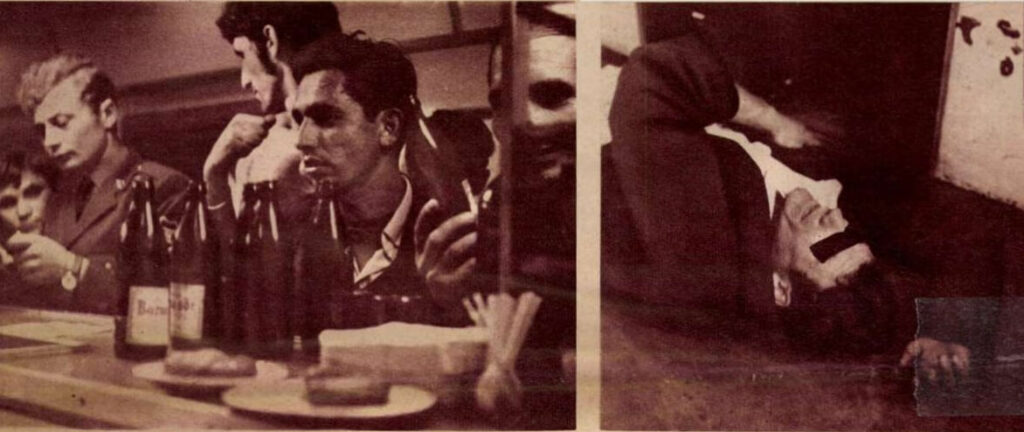
Immediately after departure in the Bistro carriage of the weekend train to Nyíregyháza.
The main act: beer
Life in danger
IMRE SZILÁGYI, Member of the Executive Committee of the County Council, Head of the County Directorate of the Statistical Office:
- As a statistician, I don't count, but it's probably 10-15% who get completely drunk on trains, usually with beer. And beer, if you drink too much of it, makes you very distorted. I do not know how many people get completely drunk on the way home, because they travel further from Nyíregyháza, and there are other train stations and their surroundings where they also have the opportunity to get drunk. I would only consider it a comfort if I could stop in the train corridor and not have to constantly bump into people who are drunk. In the two first classes, for example in the 5 and 6 carriages of the express, it is not possible to travel in peace, because the Passenger Services are between the two carriages and everyone from the front and back of the train wanders there, if only out of boredom. There are soft drinks, but the main commodity is alcohol. It is apparently an effort by the
Passenger catering company, to maximise its revenue from beer and other spirits, so "passenger catering" equals: alcohol catering.
MIHÁLY TOMASOVSZKI Head of the Labour Department of the County Council:
- The Passenger Transport Company on the train, at the station, seems to have a corporate interest in getting passengers to buy as much alcohol as possible, even though the social interest would actually require a multi-faceted passenger service and yet
it seems, they are unscrupulously drinking the passengers, even the drunk ones. There are no proper controls by the authorities: fines of perhaps two or three hundred forints are imposed, and this does not solve the problem. Nor does the fact that they have reduced the advertising of drinks. Some of the commuters live in a completely alien environment, with no family control. And if one or two drinkers get in their midst, the whole group drinks, the whole way. The stench of beer on the bus or train is smelled by others, and the stench of the beer is a threat to everyone's peace of mind and safety.
ANGYAL DANIEL, Councilor of Hodas:
- I went to the Council Academy in Pest for a year, on Saturdays
it was simply impossible to get home. There were many fights on the weekend train or bus. You could say that the Passenger Service Buffet on the train was inferior to the last little spit hole on the farm. If a more sober working man wants a cooler - if he can even get there - the buffet man says no. But the intoxicating vermouth, that's a must.
MÁRIA KŐVÁRI, conductor of Volán 5:
- I understand that they have issued a regulation that you are not allowed to sell brandy in half-decent bottles in the pavilions at the stations. But they've done much worse than that, because the Passenger Supply Company is selling two-decimal and half-litre bottles without a hitch, and people are drunker.
By the time the train arrives in Nyíregyháza and Mátészalka, those of us with weaker resistance have been completely stripped of our humanity by the organised occasion. Volán employees have to transport them home in this condition, without accident, in order and with responsibility. This is what one of the experienced conductors and one of the most directly
interested driver:

ANTAL JUHARI Volán guide:
- We carried sixty to one hundred and twenty people, the train arrived in Mátészalka at 23.30 and the bus only left at 0.35, they came already drunk, and here at the station they drank for an hour more. We suggested that they should start the bus as soon as the train arrived. This improved the situation a bit, because they want to go home, they run to the bus and don't stop after the train and before the bus to drink more at the station.
- The drunk people make the bus look like a brandy barrel; they fight, they brawl; it's horrible while you collect the money. I take a strong stand, because even ten percent of the people on the bus don't understand "let there be a heart" in this state. I say, "You're not leaving here until you change your ticket." But a young person, who is not even from there, cannot do that, and he who pays pays, and he who does not, does not. It's nerve-wracking. This flight has finally been taken away from me. I've been doing it for a long time. .
GYÖRGY MURNYÁK Volán driver:
- By the time they get here, they're already completely drunk on the trains. They
I have heard that the Passenger Service has already stopped selling brandy on the workers' train, but it is worth nothing, because such
it's the beer on the long road that does the damage. And in Ferencváros and Nyugati, the Passenger Supply Company is selling corked brandy by the litre, not by the half-decise. The truth is that the conductor and I don't dare to speak to them. They beat up my shifter and chased me away. ...they're hitting each other in the bus, the ceiling's stabbed. I went to the police to ask them to come out on a Saturday off and help us, because you can't fight two people like that. They've already come out three or four times, they've taken away some drunken brawlers, and now the situation has eased a bit: even if he's drunk, he gets on the bus and keeps quiet.
Home
Drinking and driving while commuting is not just a transport problem, and it is not only fellow passengers and Volán workers who suffer. It is a multifaceted social issue, which is particularly acute in municipalities with a large number of commuters.
DOMBRADE
JÓZSEF NAGY, secretary of the municipal party committee :
- In late September, at the meeting of the Popular Front Committee, we discussed the problem of alcoholism. Speakers complained that the number of shops selling alcohol was increasing by the day, and that there were no food shops or newsagents in stations where alcohol was not available. Some people who go to work from far away have a habit of coming home drunk and drinking what money they have left at home. Unfortunately, at stations, on the train, and during the journey, the Passenger Transport Company creates too many opportunities for people to buy alcohol. Here, too, opposite the station, there is a mushroom selling drinks, managed by the SRA, a source of drunkenness and accidents, and we are determined to eliminate it.
HALMOSI LUKÁCS, station chief: - I told you, if it wasn't for this mushroom next to the station, I would have lived at least three years longer.
LÁSZLÓ NAGY, council president: - The commuters coming home is reflected in the fact that the village is full of drunk people.
HODÁSZ, LAKATOS BERTALAN, SECTOR PRESIDENT:
- Most commuters arrive already drunk, but they are not going home, but to the drinks shop next to the station. They leave a lot of money behind. I am not in favour of the proliferation of liquor shops: we have issued an order that the proportion of drinks in retail shops should not exceed ten per cent of the total stock. This is the first time that we have achieved a turnover of 300,000 less than planned for drinks and a quarter of a million more for retail.
DÁNIEL ANGYAL, Councillor:
- We looked at the family budgets of commuters who drink: they usually earn two thousand forints, spend six hundred on their own food, four to five hundred on food at home, and spend eight hundred thousand on drinks and entertainment.
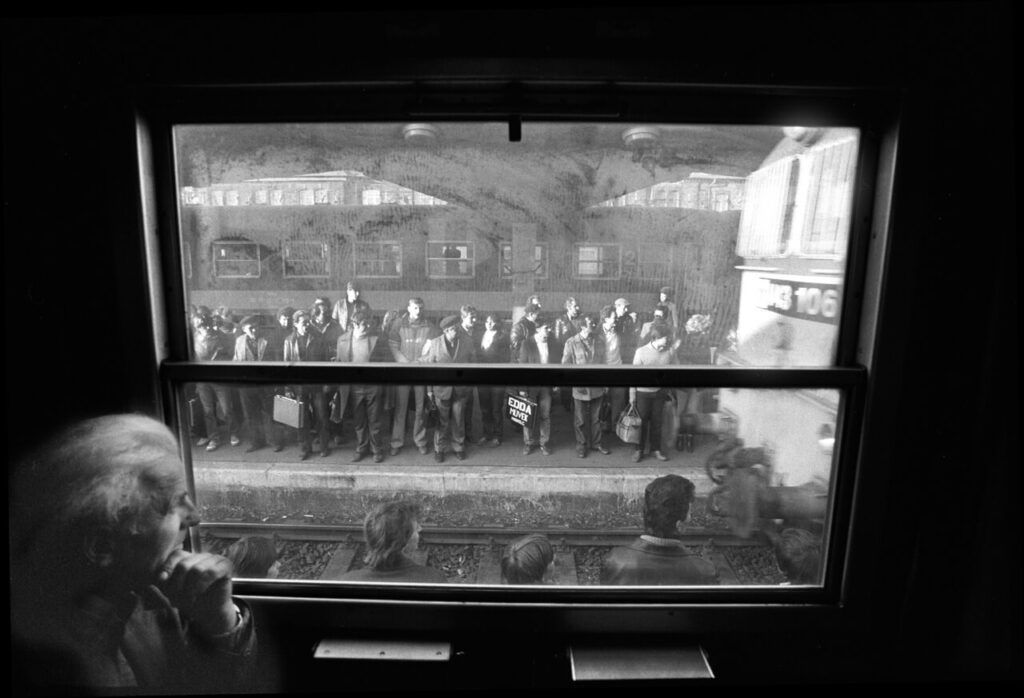
Picture of Péter Korniss from the series "Guest worker".
FERENC GARAMI, headmaster of the primary school in Hodász:
- If the father is still drunk when he returns home, how can he take care of his family? For children who are truant from school and at risk, this is often the reason. And the mother usually says: "I can't handle the child anymore". At home, local authorities can and do do do something in their own right, and they intend and want to do so, as the examples of Hodász and Dombrád show. But they cannot change the fact that commuters arrive home drunk. Action by national bodies,
would need to act together. And here the question immediately arises: what action should be taken?
Proposals
BÉLA MIKE, driver of the 5 Volán headquarters:
- You should exclude from the trip anyone who is so drunk and smart.
MIHÁLY TOMASOVSZKI, Head of the Labour Department of the County Council:
- There is no authority to enforce this. .
GYÖRGY MURNYÁK, driver of Volán 5:
- The best solution is for the police to come out, because if they see them, they
remain silent.
MÁRIA KŐVÁRI, guide of Volán 5 :
- Sell more soft drinks!
FERENC GARAMI, headmaster of the primary school in Hodász:
- Many commuters would sign that their family should receive their salary, and that they should only be paid the hundred or two hundred forints that is enough for travel and a glass of beer at the most. So it would not be so hard to resist the temptation.
DÁNIEL ANGYAL, Councillor:
- Commuting is dangerous and should be eliminated. In a few years there will be enough jobs in the area. In the meantime, travel should be made more cultural. A cultured environment would help to change people, but a train full of booze, smeared with drunk people, has the opposite effect. . .
(To take this line of thought further, it might be worth considering how much a liquor-free travel would increase the cultural value of travel.)
ILYÉS LAJOS tsz-president:
- The workers are predominantly unskilled. So many unskilled people
we will not be able to employ in the area later. It is mainly vocational training and schooling that needs to be improved.
JÓZSEF NAGY Party Committee Secretary:
- Tougher sanctions against drunk travellers would require the travelling public to take action against them (not instead of the authorities, but in support of the authorities' actions. A link should be established between the council of the place of residence and the workplace trade union, and notorious alcoholics should be jointly detected and monitored, and action taken if necessary. The Belker Regulation should be enforced and those who serve drunk people should be punished more severely. The quality of the refreshments is not satisfactory and the prices are high. Under no circumstances should the number of alcohol outlets be increased.
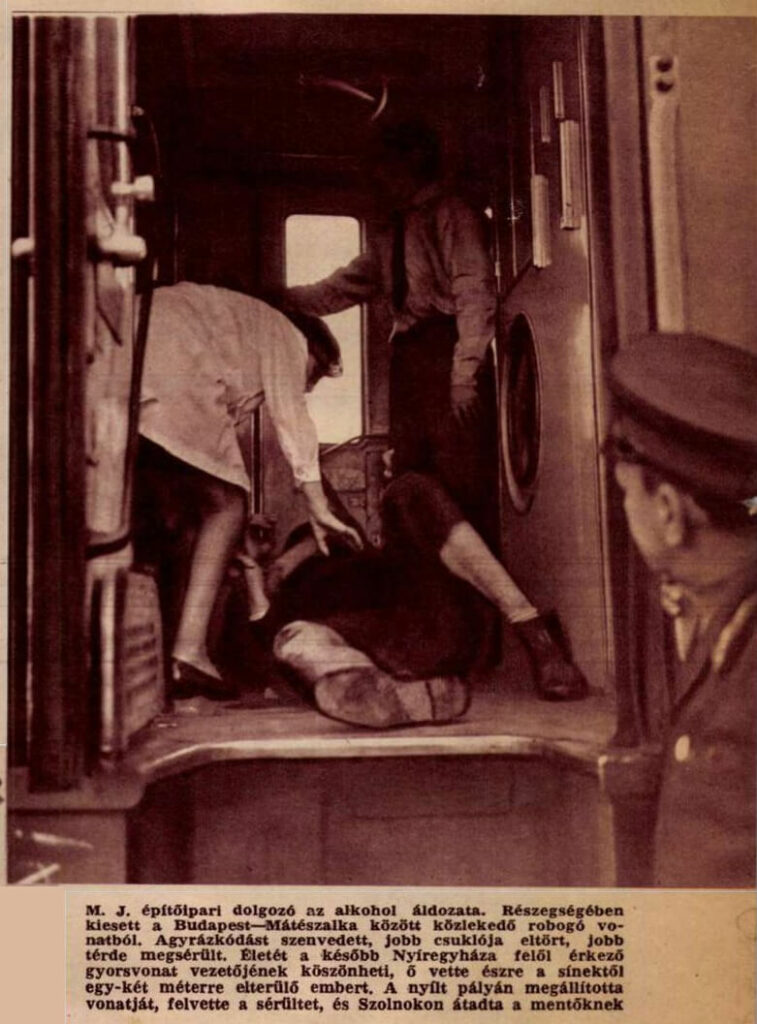
LÁSZLÓ NAGY, President of the Council:
- The number of alcohol outlets should be set in relation to the number of inhabitants. Those who cause public scandal should be prosecuted more severely and the number of sobering-up stations should be increased.
HALMOSI LUKÁCS, Station Chief:
- In the vicinity of the stations, I would eliminate the sale of alcohol within a few hundred metres, and concentrate it in catering combinations. No alcohol would be available at all in railway stations.
MIHÁLY TOMASOVSZKI, Head of Labour Department:
- If the industrial centres need workers, they should relocate them there through housing benefits. Travel is very expensive and workers often arrive at the company on Monday in a state of disrepair. Do not split up families, because that is the biggest problem.
IMRE SZILÁGYI, Member of the Executive Committee of the County Council:
- I know that not everyone thinks it is appropriate for me to express my opinion, but in such matters, democracy always means the interests of the majority, and those who violate this, those who disturb the peace of others while travelling, those who insult transport workers with drunken words and actions, I would recommend a much tougher, much stricter approach.
From me! Eliminate!
All fifteen interviewees were asked by the journalist whether they felt it was ultimately necessary to ban the sale of alcohol from railway and bus stations, stations, trains and buses, and whether this solution alone would not be fully effective.
Twelve of them voted clearly and very strongly in favour: Mihály Tomasovszki, József Nagy, László Nagy, Lukács H almosi, Dániel Juhari, György Murnyák, Béla Mike, Mária Kővári, A ndrás Litauszki.
Juhari A ndras also expressed the collective opinion of the drivers and conductors in the vote:
- We transport workers are against the sale of alcohol where there is traffic. The three dissenting, amending, reserving votes are justified in this way:
Kun Lajos:
- They buy it elsewhere, they take it home.
Ferenc Garami:
- Eliminate it on the train and in the stands, I would keep the class seats .
Imre Szilágyi:
- If I knew that this would solve the problem, I would say abolish it. It is also true that opportunity breeds thieves, if there are more and more opportunities, they drink more and get drunk more.
Fifteen of them formulated the question that needed to be answered.
- is worth -
